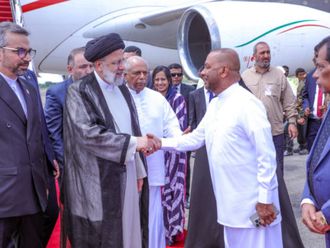Occupied Jerusalem: Remarks by Palestinian leader Mahmoud Abbas allegedly forsaking the right of Palestinian refugees to return to their homes in Israel may have enraged Palestinians but got a warm welcome from some quarters in Israel. “These are significant words,” Shimon Peres said. “These positions stand exactly in line with those of Israel and with the clear majority of the population, which supports the solution of two states for two peoples. This is a brave and important public declaration in which [Abbas] makes clear that his aim for a state is only within the West Bank and Gaza, and not in the territory of the state of Israel,” Peres said. “[His] courageous words prove that Israel has a real partner for peace,”
The Palestinian leader’s office meanwhile sought to dampen the impact of the remarks. Benjamin Netanyahu’s office dismissed the remarks as contradictory to Abbas’ actions.
Peres said in a statement that Abbas had rejected terrorism and “pledged that under his leadership, there will not be a third intifada”.
“He understands that the solution to the refugee problem will not be on Israeli territory. These are statements of great importance,” Peres said.
On Twitter, Netanyahu’s spokesman Ofir Gendelman charged that Abbas had refused for years to renew negotiations with Israel with no preconditions, which has been a long-standing offer from Netanyahu.
The Abbas comments sent thousands of Palestinians onto the streets in protest in the Hamas-ruled Gaza Strip where they burned his picture and chanted “Out, Out, Abu Mazen.”
In an interview broadcast on Friday night by Israel’s Channel 2 television, Abbas said he had no intention of trying to regain his childhood home in the northern town of Safed in Galilee, today located inside Israel.
“I want to see Safed,” he said in English. “It’s my right to see it but not to live there.”
In a direct pitch to Israeli viewers aimed at assuaging their concerns ahead of a Palestinian bid to seek upgraded UN status, he reiterated his acceptance of the Israeli state within the borders that preceded its capture of the West Bank, the Gaza Strip and occupied east Jerusalem in the 1967 Six-Day war.
“Palestine for me now is ‘67 borders with east Jerusalem as its capital,” Abbas said.
“This is Palestine for me. I am a refugee, I am living in Ramallah, I believe that the West Bank and Gaza is Palestine and the other parts is Israel.”
He reiterated that the Palestinians would submit a bid this month to seek upgraded UN status.
In September 2011, Abbas made a high-profile bid at the UN General Assembly for full-member status, which stalled before it was put to a vote in the Security Council where the United States had pledged to use its veto power.
At this year’s annual UN gathering, he said he would seek to obtain non-member state ranking by the end of 2012, in a move that would only require a simple majority in the 193-member General Assembly and is certain to pass easily.
Washington and Israel are both opposed to the move.
Abbas spokesman Nabeel Abu Rudeina insisted that this did not represent a policy shift and said that giving up the right of return would create “a catastrophe for the Palestinian generations to come”.
“The right of return is among the issues that are still pending in the negotiations with Israel,” he said in a statement. “A television interview does not mean negotiations and the aim of the interview was to influence Israeli opinion.”
Abbas was born in Safed in 1935 in what was then British-ruled Palestine. With the founding of the Jewish state in 1948, he fled into exile along with hundreds of thousands of Palestinian Arabs.
“These are significant words,” Peres said. “We must all treat them with the most respect.
“These positions stand exactly in line with those of Israel and with the clear majority of the population, which supports the solution of two states for two peoples. This is a brave and important public declaration.”
Abbas also pledged that as long as he remains in his post there would be no armed resistance to Israeli occupation on the part of his western-backed Palestinian Authority.
“As far as I am here, in this office, there will be no third armed intifada, ever. We don’t want to use terror; we don’t want to use weapons. We want to use diplomacy.”
In a dig at his Hamas rivals, Abbas said that frequent rocket fire into Israel from Gaza served no purpose.
“I am not sure that there is justification for firing rockets from Gaza or elsewhere,” he said.
“It doesn’t bring results and it doesn’t bring peace closer,” he added.
In Gaza thousands demonstrated against Abbas’ remarks, in protests called by the Islamic group that has said it will never recognise Israel.
In Jabaliya refugee camp about 3,000 people chanting “Out, out, Abu Mazen!” marched and burned his picture, while thousands more protested in Gaza city and in the southern town of Khan Yunes.
On Friday, Gaza’s Hamas prime minister Esmail Haniya told worshippers after weekly Muslim prayers that Abbas “has no right to give up refugee rights. He does not speak in the name of the refugees”.












